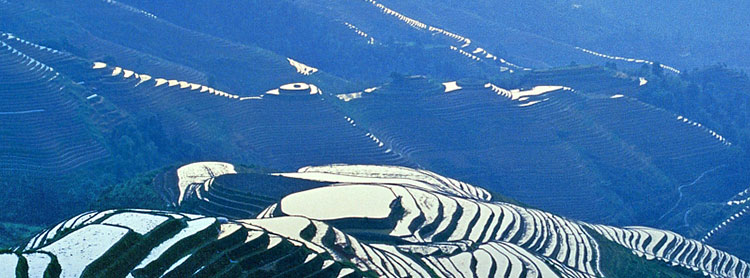
 Discover Guilin
Discover Guilin
Gongcheng Yao Autonomous County is located in the southeast of Guilin City, Guangxi Zhuang Autonomous Region, adjacent with Sanxiang to the north and Yuewu to the south. It is 108 kilometers away from the downtown and with a jurisdiction over 117 administrative villages of 6 towns and 3 townships, covering an area of 2,139 square kilometers and a total population of 300,000 people.
The Yao Autonomous County was established in 1990 with the approval of The State Council. The Yao ethnic group accounts for 60% of the total population. The 100-meter-long Meishan Map (a series of paintings depicting ancient sacrifice rituals in the Ming Dynasty)was painted in 1743 in the ninth year of the reign of Emperor Qianlong of the Qing Dynasty. It is the only colored scroll ever found in China displaying the history and culture of the Yao. Gongcheng oil tea is the most famous distinctive traditional diet of Yao ethnic group. In 2019, Gongcheng oil tea set the Guinness World Record for “having the most people making oil tea together simultaneously". The Yao cultural traditions are well preserved with such festivals of strong Yao distinctiveness as the Panwang Festival, Powang Festival, Fireworks Festival.
The county has a history of 1,400 years since its establishment in the 14th year of Sui Dynasty (618) and is famous in China for its history and culture. There are key cultural relic sites of state-level protection including Wenmiao(the temple of Confucius), Wumiao(the temple of Guanyu, a historical figure in the period of the Three Kingdoms), Zhouweici(an ancestral hall built in the Song Danasty for the local official named Zhouwei) and Hunan Guild Hall. 18 ancient villages are ranked in the China’s traditional villages list, and 10 kinds of folk skills are listed in Guangxi intangible cultural heritage catalogue.
The county adheres to sound ecological development to maintain a beautiful ecological environment. It constantly consolidates and improves the unique ecological agricultural development mode with breeding as the foundation, biogas as the bond, and planting as the key, and continues to promote the ban on broad-leaved forest logging, goats herding, reclamation of woodland of 25 degrees of slope, and eucalyptus planting. The county is among the first to be selected as a livable city with amiable climate and has won the “Award for Demonstration of Good Living Environment in China”. It is also listed as the national key ecological function zone, the pilot zone of demonstration area for innovation in the National Sustainable Development Agenda, and the “model of rural ecological economy development in developing countries” by the United Nations.
With great convenience in transportation, it only takes half an hour to get to Guilin, two hours to Guangzhou, and three hours to Nanning and Shenzhen, by way of bullet train, which also goes through to Guizhou, Chongqing, Chengdu and other provincial capitals.
The county’s economy has obtained rapid growth. Its ecological agriculture has put on accumulative development and the cultivation system of Gongcheng persimmon was recognized by the Ministry of Agriculture as the fourth batch of China's important agricultural cultural heritage. The county has introduced in enterprises like the China National Building Materials Group, China Guodian Corporation and China Datang Corporation, vigorously developed industrial industries such as cement and wind power, and realized annual tax revenue exceeding 100 million yuan per enterprise. The county is dedicated to development of ecological and cultural tourism, and has been selected as Guangxi famous tourism county as well as the pioneer for tourism demonstration zone building in China.
In 2022, the county’s gross regional product reached 9.531 billion yuan, up by 2.7%, the general public budget revenue increased by 0.1%, the industrial added value above designated size by 7.7%, and the investment in fixed assets by 16.2%, while the total retail sales of consumer goods decreased by 2%, and the per capita disposable income of urban and rural residents increased by 4.1% and 5.8%.